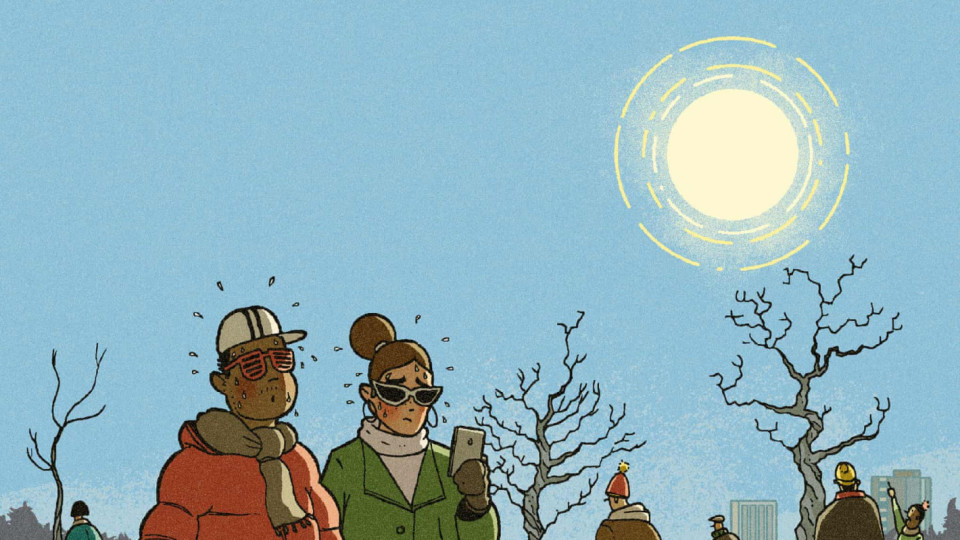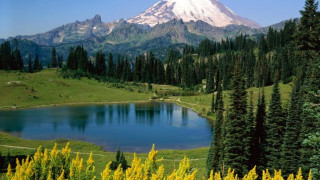
The February heat was unnatural. I used to discover wild climate energizing, however at this point it summons the end of the world of environmental change
There was a period on these mild islands when crack climate excited us with its episodes of outstanding warmth, wind, downpour or snow. Except if you were adrift in a hurricane, dread was an uncommon feeling. Indeed, even in 1987, when the alleged Great Storm plunged through southern England and northern France on a night in mid-October, it was conceivable to be more awed than apprehensive. Smashing branches and tumbling slates woke individuals, yet when they swung to one another in bed it was to shout about the breeze's quality – "Would you simply tune in to that!" – as opposed to consider it to be an omen of something bigger or progressively horrible. Thirty-odd years after the fact, the greater part of the general population who survived the Great Storm recall it for the most part on the grounds that a BBC meteorologist got the figure off-base.
In England, the breeze blasted at 120mph that night, and something like 22 individuals were murdered on the two sides of the Channel. In any case, except if you were among the dispossessed, or had a tall oak fall through the rooftop, no one felt nervousness or depression. There was no common anguish.
The essayist Jonathan Raban saw the scene in Hyde Park, where little groups had assembled around the vast holes left by evacuated trees, and buzzsaws made the recreation center "as boisterous as a logging camp". Raban noticed a prevalent response. "It's so tragic, individuals stated, attempting to extinguish their grins – for they didn't feel dismal by any stretch of the imagination," he composed. "They were excited by the sublime annihilation of the breeze: maybe the world itself had come tumbling down, and even the shyest, most pacific individuals in the group felt some noting harmony of brutality in their very own temperaments react to this enormous and unlooked-for demonstration of savagery in nature itself."
That appeared to be consistent with me. As a youngster, lying late in bed on a Saturday morning, I would envision that the bedstead had electric-controlled haggles be driven anyplace in any climate, while I lay cozy with a heated water bottle under a waterproof blanket, guiding the bedstead into storms and deluges. Growing up close to the ocean, I could rehash this juxtaposition of solace and peril by settling on a stormy evening in a little empty over the shore to watch the enormous, dark waves crush over the stones as though they had taken against them. From a vantage point that was protected and moderately warm, the climate introduced itself as an amusement.
Now and then, plainly, it was more than that. In 1953, watching out from our front room on a moving ocean, I heard grown-ups talk gravely about how a similar tempest had sunk the ship Princess Victoria on its section to Northern Ireland, with the loss of 133 travelers and group. Also, in January 1968 a more grounded and significantly more harming breeze than the Great Storm of 1987 tore west to east crosswise over Scotland, leaving 20 individuals dead and a few hundred destitute.
Working a late move on a Glasgow paper that night, I thought I saw the glass in the workplace windows twist inwards before it broke; a scene that may have a place with the Book of Revelation ("And there fell upon men an incredible hail out of paradise, each stone about the heaviness of an ability; and men reviled God in light of the plague of the hail… "). In any case, as the possibility of a reformatory God had kicked the bucket long back, even on a Presbyterian paper, for example, the Scottish Daily Express, climate was left as a progression of arbitrary occasions detached to any human movement.
In any case, provisional associations were being made. By the mid 1960s, researchers knew certain that centralizations of carbon dioxide in the air were ascending; there was, or could be, a "nursery impact". In 1975 the geophysicist Wallace Broecker promoted the expression "an unnatural weather change", in any event among mainstream researchers, when he included it in the title of a scholastic paper. It was just in 1988, in any case, that it started to be viewed as a squeezing worldwide concern – on account of the declaration of the climatologist James Hansen before a US Senate advisory group, the arrangement of the Intergovernmental Panel on Climate Change (IPCC), and crafted by the author Bill McKibben, whose book The End of Nature, distributed in 1989, was an early groundwork to environmental change's presumable impacts.
The a long time since have been lived out in a sort of forswearing: not regarding worldwide meetings and exhibitions, or the development in sustainable power source and the look for the ideal electric vehicle, however in our evident conviction that nothing central will change. McKibben wrote in Granta magazine in 2003 that individuals still pondered a dangerous atmospheric devation "in the manner in which they consider 'savagery on TV' or 'developing exchange shortages', as a peripheral worry to them, if a worry at all … barely anybody has dread in their guts".
For some individuals, that may at present be valid: "FABruary: record-breaking daylight [as] UK has most smoking winter day at any point", reported the Sun's celebratory first page on Tuesday, with any reference to environmental change bound to a last section on page five. In any case, that treatment appeared to be antiquated in some way or another, and dissonant with a tardy yet assembling caution at the possibility of harvest disappointment, biodiversity misfortune, water shortage, backwoods fires, ocean level ascent, soil debasement, mass movement and the various horsemen in the mounted force of the end of the world that undermines to clear through the world before the century's end. Another American blockbuster, The Uninhabitable Earth by David Wallace-Wells, spreads out the region with the motto, "It is more regrettable, much more awful, than you think"– however its predictions are drawn from deductively decent projections that are a long way from most pessimistic scenario.
How might we live with this prospect and not go frantic? The site of Extinction Rebellion, which expects to change government demeanors to atmosphere breakdown through peaceful obstruction, conveys a film, Heading for Extinction and What to Do About It, which is one of the plainest bits of film-production you will ever observe. A female researcher remains in what appears to be her unobtrusive kitchen and talks for a hour to a little group of onlookers (never in shot) about human civilisation's plausible destiny. "Customarily, you attempt to be somewhat confident," she says toward the start, "yet this is an alternate sort of talk." What we need, she says, isn't trust yet mettle. We're going towards three degrees of warming, and that will be disastrous, "such as getting onto a plane that has a one of every 20 possibility of an accident".
Part of the way through her discussion, she enables her gathering of people two minutes to lament for our future misfortunes. At that point she welcomes us to act – to change the future fear through present demonstrations of quiet challenge. Is it extremely worth attempting? That, she says, is the wrong inquiry. We should carry on of "a craving to be a commendable precursor".
At the point when Raban visited Hyde Park in 1987 to take a gander at the fallen trees, none of that discourse was possible. We had at that point, and for quite a while after, yet to feel dread in our guts.











Leave a comment